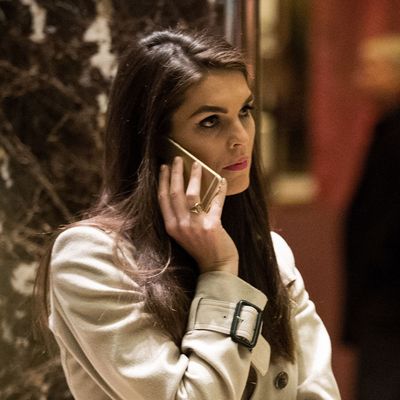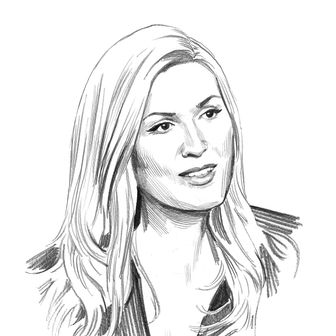
By Friday, if the reported timeline is correct, White House communications director Hope Hicks will have been interviewed by Special Counsel Robert Mueller as part of his investigation into potential collusion between Donald Trump’s presidential campaign and the Russian government.
Hicks is one of many White House officials cooperating with Mueller — a list that now includes Jared Kushner, the president’s son-in-law and adviser. Kushner’s November interview with investigators regarding Michael Flynn was revealed Wednesday by CNN. In news that broke Friday morning, Mueller filed a charge against Michael Flynn, the president’s former national security adviser, for “willfully and knowingly” making “false, fictitious and fraudulent statements” to the FBI. Flynn is pleading guilty. Reports that Kushner directed Flynn to reach out to Russian officials came as another portentous sign for the White House about where Mueller’s probe is likely headed.
But even counting those White House officials related through blood or marriage to Donald Trump, Hicks is set apart by her unusually close and consistent proximity to him, and her pansophical understanding of his universe. Since January of 2015, when he first asked her to travel with him to Iowa as he prepared to announce his candidacy, she has remained by his side, outlasting far more experienced operatives and staffers to become one of just a few remaining members of an insular network of confidantes, and perhaps the only senior White House official whose status never seems in doubt. Beyond that, she arguably spends more time in the company of the president than any other senior staffer. This makes her insights and interpretation of events highly valuable to anyone attempting to piece together what exactly went on at Trump Tower and in Trump’s mind as he sought the presidency. Hope Hicks has seen some shit, in other words, a quality that likely appeals to federal investigators.
Hicks declined to be interviewed for this story, meaning this story is similar to nearly every other story ever written about her. On the campaign, she was the spokeswoman who didn’t speak; in the White House, she’s the communications director who hardly communicates. And she would like to keep it that way: Not only does she not appear on TV, but she hardly gives on-the-record comment or attaches her name to statements anymore. She exists only in sporadic headlines, or in photos published by tabloids like the Daily Mail, where she’s become something of a recurring character in the dramatic coverage of the sartorial choices of the Trump Women. Neither she nor her attorney, Robert Trout, would respond to requests to confirm or deny the reports that she would sit down with Mueller before December 1. The less she says, she seems to have calculated, the likelier her connection to Mueller’s investigation would be to fade from public consciousness.
Former senior White House officials and Trump campaign operatives who did talk to New York did so on the condition of anonymity — citing fears of drifting into Mueller’s notoriously laserlike focus.
“After Ivanka, she knows him the best in the White House,” one campaign adviser said.
A former senior White House official emphasized that Hicks has existed alongside not just the president, but “the campaign staffers and in the White House through the arc of this entire story. I do believe the president that there is no collusion, but if you were Mueller, of course you’re gonna sit down with individuals like Hope and Manafort and Flynn and others that were involved during those periods of time you’re looking into.”
The former senior White House official said Hicks’s meeting with Mueller wasn’t a sign that the president or any current or former administration officials are in trouble. (It’s worth noting here that the Flynn plea bargain deal seems to be a clear sign of the opposite.) But throughout my other conversations with those close to the White House, alarm and unease at the thought of someone so constantly present being probed for information was palpable.
At 29 years old and with no previous political experience, Hicks is the president’s longest-serving political aide — a testimony to how unusual a politician he is, surely, but also a testimony to her unique survival skills.
She grew up in Greenwich, the daughter of a public-relations-guru father and a Christie Brinkley look-alike mother. She was a child actor and model, and maintained her show-businesses aspirations through college and early adulthood.
She entered PR herself when, while at a Super Bowl tailgate when her father was representing the NFL, she walked over to Alec Baldwin to introduce herself, having recently auditioned to appear in a movie with him. Baldwin was standing with his then-spokesman, Matthew Hiltzik; soon enough, Hicks would abandon her movie ambitions to work for Hiltzik in New York, where she was placed on the Ivanka Trump account. Eventually, she’d leave Hiltzik’s firm to join the Trump Organization itself, working closely with Ivanka internally and forging a friendship with her. It was with Ivanka’s endorsement and blessing that Hicks became a member of the Trump campaign.
Throughout the election, she was by Trump’s side at nearly every turn, traveling across the country on his private plane, acting as press secretary and scheduler and nanny and therapist and Good Cop and whatever else the job called for.
In the White House, she first assumed a title created specifically for her (“Director of Strategic Communications”) before a series of resignations and firings erupted over the spring and summer: Michael Dubke, the communications director, resigned in late May; Sean Spicer, the press secretary, resigned when it became clear that Anthony Scaramucci would be hired in Dubke’s place; and then Scaramucci was summarily fired for conduct unbecoming — which is how Hicks ended up the White House communications director.
Her office is right outside of the Oval Office, closer than any other official — so close that, from her desk, the president can be heard calling for her.
Hicks has mostly avoided controversy even while living at the center of the biggest controversy in modern political history. This is partly why she’s survived as so many around her have toppled. In many respects, she’s played the long game, opting to be careful and deliberate in a way few on the campaign and in this White House — least of all the president — are. But how careful can anyone be in the inherently dangerous endeavor of working for Donald Trump? To anyone in his orbit for whom Mueller’s investigation may have implications, Hicks’s ability to survive — that is, the fact that she’s been around so long by Trump standards and, again, has necessarily seen some shit — is potentially a problem.
When Sergei Ryabkov, the Russian deputy foreign minister, said, following the 2016 election, “there were contacts” between the Russian government and the Trump campaign, it was Hicks who publicly issued a denial. “It never happened,” she said. “There was no communication between the campaign and any foreign entity during the campaign.” We would come to learn that this was false, that plenty of Trump campaign officials had met with or had contact with Russian government operatives. Centrally, Donald Trump Jr., Kushner, and Paul Manafort — the former campaign chairman whom Mueller has already indicted — met in Trump Tower on June 3, 2016, with Natalia Veselnitskaya, a Kremlin-connected lawyer who promised damaging information about Hillary Clinton.
Campaign officials told New York that statements like Hicks’s denial were often directly dictated by the president to Hicks or whoever else was providing them to the press on his behalf. One such source said they believed her comment was Mueller’s focus in interviewing her, and that because it likely came directly from the president, the chances that she’d find herself personally in trouble were slim. Another source said that Hicks would likely benefit because she was not among the small group of advisers— Ivanka, Jared, and Stephen Miller — who reportedly accompanied Trump to his golf club in Bedminster, New Jersey, the weekend of May 5, when he discussed firing James Comey.
Speculation and nervousness about Hicks and Mueller aside, the former senior White House official who spoke to New York said the president was wrong to believe, as he has reportedly been telling people in private, that the investigation is almost over. “There are several in the White House including the president’s lawyers who believe that by interviewing Hicks and other senior staffers, that we’re at the end of the investigation. I happen to disagree with them on that. If you look at Washington investigations, they generally go on 18 months, two years. We are just, I think, in the middle of this investigation, which is unfortunate, but I don’t see this thing coming to an end anytime soon.”
We’re unlikely to gain clarity from Mueller, whose adherence to silence is well established, or from Hicks, the only person in Washington these days with a similar reputation.






























